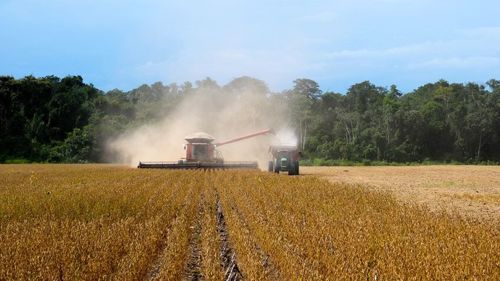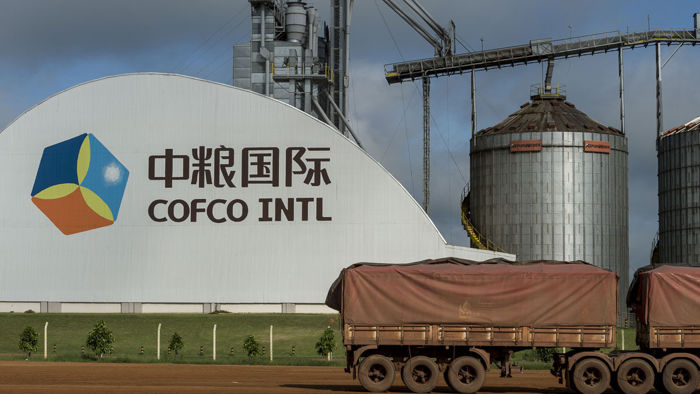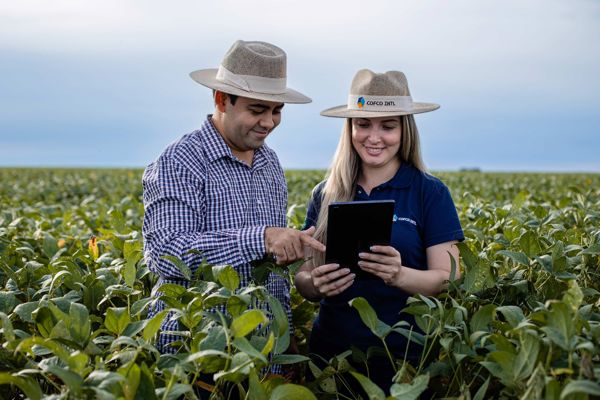
COFCO International’s new $1.6 billion loan brings savings to fund further sustainability work
COFCO International has signed an agreement for a new $1.6 billion multi-tranche sustainability-linked loan with a lower interest rate, the margin savings from which will be used to fund its environmental and social assessment on soy supplying farms and Environmental, Social and Governance (ESG) risk management.
$1.6B sustainability-linked loan
COFCO International can access such loans because of its strong sustainability record and the loan agreements also then include a discount, which translates into funds that are used to develop the company’s sustainability programmes.
A total of 19 banks from China, Australia, Europe, Japan, Singapore and the United States, have agreed to provide financial incentives in the form of lower interest rates for COFCO International to achieve pre-agreed key performance indicator (KPI) sustainability targets in three areas. These are its ESG management score, as measured by Sustainalytics rating agency, and the traceability and the socio-environmental screening of its direct supplies of Brazilian soy.
Each sustainability target will be audited annually by an independent third party and the discount will be applied based on the KPIs achieved by the company.
Banks are providing financial incentives in the form of lower interest rates for COFCO International to achieve pre-agreed sustainability targets in three areas, including the traceability and socio-environmental screening of its direct supplies of Brazilian soy.
“With the increased focus on climate change and the contribution towards the UN’s Sustainable Development Goals, sustainability-linked loans are fostering a greater interest among financial institutions than regular, plain vanilla corporate loans,” says Vivek Sharma, Group Head of Financing for COFCO International.
The new loan comprises a 1-year and a 3-year revolving credit tranche. It is COFCO International’s third such facility, as awareness of sustainability among financial institutions and their stakeholders has increased significantly.
“When we initiate discussions with banks on any potential financing transaction, we discuss the potential use of the facility and our general initiatives for sustainability projects. Then, together with the banks, we do a deep dive on various sustainability initiatives, future plans and their alignment with business strategy of the company. Banks also keep track of the public commitments made by the company management. The KPIs and targets are defined based on extensive discussions with lending financial institutions,” Sharma explains.
“In short, sustainability linkage for financing not only increases lenders’ appetite but also results in net reduction in the interest margins, if certain predefined sustainability targets are met.”
Shared sustainability objectives
A significant internal effort is required to meet the KPIs, which are designed to be comprehensive and forward looking”, says Julia Moretti, Global Head of Sustainability at COFCO International.
Sustainability-linked loans require a high degree of proof and assurance of the social and environmental targets, and details of companies’ sustainability practices, sourcing policies, suppliers, due diligence carried out and commitments over a horizon of three to five years.
Lenders require all of these to be audited by a third party, which is important to ensure the accuracy of sustainability-linked loan applications and that companies meet their commitments under the agreed terms. The verification of company data provides this reassurance to lenders and helps to benchmark companies for comparison.
“A significant internal effort is required to meet the KPIs, which are designed to be comprehensive and forward looking”, says Julia Moretti, Global Head of Sustainability at COFCO International. “For example, the Sustainalytics ESG rating methodology includes over 70 management indicators in a wide variety of areas – including environmental management, human rights and diversity – and that means all departments need to be engaged to achieve continuous improvement and provide proper evidence for evaluation and authentication.”
“We engage very closely with our treasury department, which is the principal actor in managing the relationship with lenders,” Moretti says. “From our side, we provide technical expertise in helping to define sustainability related KPIs that are in line with the company values, sustainability strategy, business goals and the commercial reality we operate in.”
A large part of the margin savings from the loan will go to finance activities that enable further traceability and responsible sourcing of critical commodities. Another portion will help COFCO International advance its sustainability strategy and the rest will be invested in various landscape projects, where the company engages with suppliers, and in sector initiatives, working with peers on common sustainability goals.

A large part of the margin savings from the loan will go to finance activities that enable further traceability and responsible sourcing of critical commodities.
Leading the way
“The increasing need for sustainable food sources, as the global population and demand for commodities rise, is driving the need for more such sustainability-linked loans. The private financing sector has the capacity to channel resources to support the sustainable transition of the agriculture industry,” explains Pablo Riquelme Turrent, Managing Director, Head of CIB Asia at Banco Bilbao Vizcaya Argentaria S.A. (BBVA).
BBVA, along with Bank of China (Hong Kong) Limited and SMBC Bank International plc (SMBC), are sustainability coordinators of the loan while BBVA is also the global coordinator and documentation and facility agent.
“BBVA has committed to mobilise €200 billion by 2025 to fight climate change and drive sustainable development. Of course, this is a joint effort and we are working in partnership with companies such as COFCO International to achieve this transition, providing loans to pioneers who are able to achieve sustainability targets and benefit from a lower cost of financing,” Pablo Riquelme says.

The lenders have agreed to provide financial incentives in the form of lower interest rates for COFCO International to achieve pre-agreed sustainability targets covering the traceability and socio-environmental screening of its Brazil soy supplies and Sustainalytics’ ESG Management Score.
“COFCO International is one of our most important clients. We share the same values. It’s part of our strategy to support companies taking a sector-leading position on social and environmental issues, and therefore our partnership is of real value and will help us achieve our shared ambitions for sustainability. We were honoured to be involved in the company’s first ground-breaking sustainability-linked loan, and we’re delighted to support its new ambitions by playing a key role in its subsequent second and now third loans.”
“For BBVA, it is important that COFCO International continues its leadership in sustainability and thus helps to ensure that this type of loan, which was once exceptional, becomes the market standard”, explains Jorge González Jacob, Managing Director, Global Head of Corporate Lending at BBVA
“This will make it easier for others to follow and help encourage others in the traceability process. COFCO International may also want to continue pioneering in the KPI selection of its sustainability-linked loans as it progresses in its sustainability journey, to address the key concerns of the industry,” Jorge González says.
“We have been impressed by COFCO International’s journey and ability to outperform its targets in the first years of its sustainability loans, particularly on palm oil and soy traceability, and move ahead of its peers, acting at the forefront of these efforts.”

